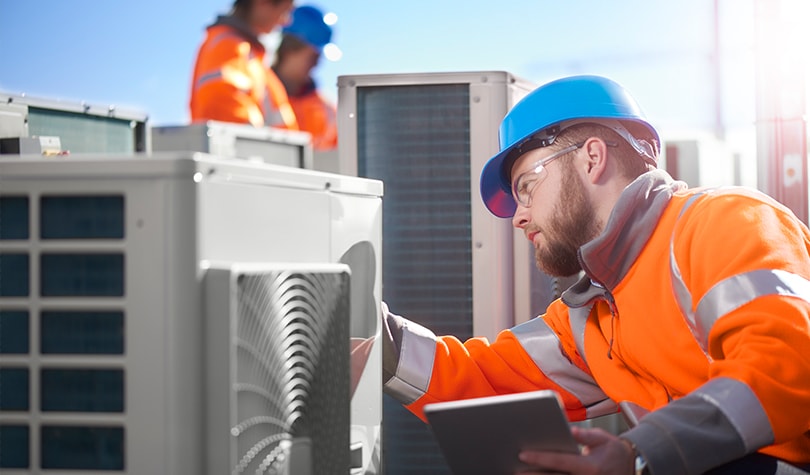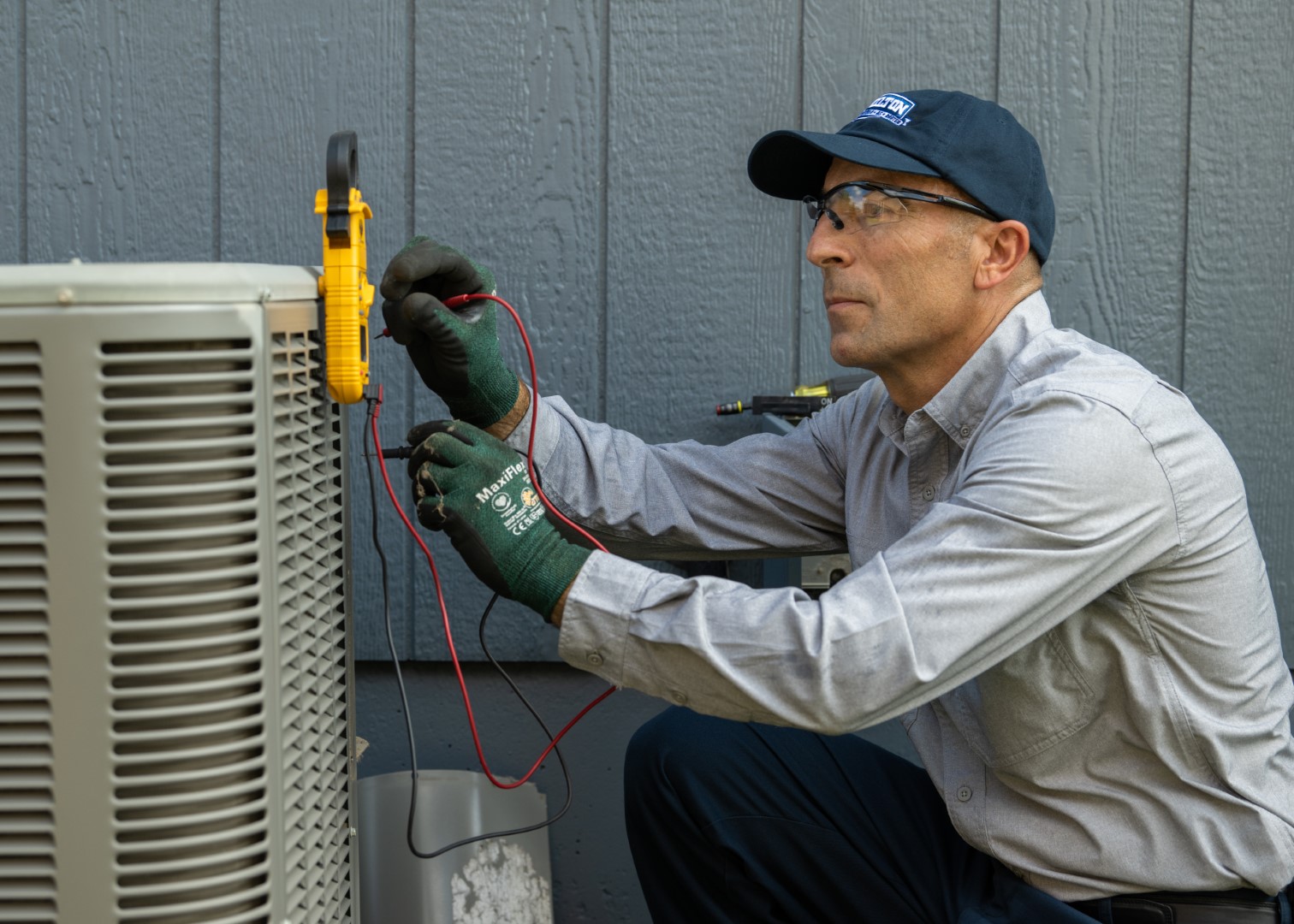AC unit replacement: what to expect
Wiki Article
All Concerning Heating And Cooling: Identifying Common Issues and Effective A/c Repair Service Approaches
Heating and cooling systems are crucial for maintaining interior comfort. Understanding their parts and capability is vital for recognizing usual concerns. Homeowners frequently deal with troubles such as inadequate cooling, weird odors, or increasing power expenses. These indications can show underlying problems that might call for focus. Checking out do it yourself troubleshooting methods can be helpful, but understanding when to seek specialist aid is just as essential. What steps can be required to guarantee lasting performance?Comprehending Your A/c System: Components and Performance
An a/c system, typically considered the backbone of indoor climate control, includes a number of essential parts that interact to control temperature and air top quality. The main aspects consist of the heating system, air flow system, and a/c device. The heating unit, commonly a heating system or boiler, produces heat throughout colder months, while the air conditioning system cools indoor rooms during the summer season.
Common Heating And Cooling Troubles Property Owners Encounter
Property owners commonly face numerous common heating and cooling problems, including irregular temperature level distribution throughout their space. Additionally, unusual noises during operation can suggest underlying problems that require focus. Addressing these worries immediately is crucial for preserving optimal system efficiency.Irregular Temperature Distribution
Many houses experience the irritating problem of irregular temperature circulation, where particular areas really feel uncomfortably warm while others remain also cold. This trouble usually occurs from a range of variables, consisting of bad insulation, obstructed vents, or an improperly sized cooling and heating system. When ducts are not adequately sealed or when furniture obstructs airflow, some spaces might get inadequate cooling. In addition, thermostat placement can considerably influence temperature level guideline; a thermostat situated in a sunlit area may misrepresent the general temperature of your house. Regular upkeep, consisting of cleansing filters and making certain ductwork is clear, can help alleviate these disparities. Home owners might also think about zoning systems to far better control temperatures throughout various areas of the home, advertising a much more comfortable living environment.Uncommon Sounds Throughout Procedure
When a heating and cooling system operates, uncommon noises can show underlying concerns that need focus. House owners may experience a series of noises, such as grinding, squealing, or hissing. Grinding sounds frequently indicate worn-out bearings or parts, while squealing can suggest loosened belts or parts requiring lubrication. Hissing might suggest a refrigerant leak, which can endanger the system's effectiveness. Additionally, banging noises could indicate loose ductwork or a problem with the blower fan. Each of these sounds acts as a warning, prompting house owners to examine even more. Neglecting these indicators can lead to more substantial problems and expensive repairs. Routine upkeep and punctual attention to unusual noises can improve system durability and performance, ensuring a comfortable living atmosphere.Indicators That Indicate Your Air Conditioner Requirements Repair Work
How can one tell if their cooling device wants repair work? Numerous indications may suggest underlying issues calling for professional interest. If the AC falls short to cool down the area efficiently, it may suggest a refrigerant leak or compressor malfunction. In addition, a boost in energy costs without corresponding use adjustments could signify ineffectiveness in the system. Property owners ought to likewise be alert to uncommon smells rising from the unit, which might suggest mold and mildew development or electric concerns. If the Air conditioner regularly cycles on and off, it could be a sign of a malfunctioning thermostat or various other mechanical troubles. The visibility of water merging around the unit can indicate a blocked drainpipe line. Acknowledging these indications early can save time and money, ensuring that the air conditioning system operates efficiently and successfully.Do It Yourself Troubleshooting Techniques for HVAC Issues
When dealing with a/c issues, house owners can employ several do it yourself troubleshooting strategies to determine the trouble. Trick techniques consist you can find out more of checking thermostat settings, inspecting air filters, and assessing drain concerns. These steps can help pinpoint usual breakdowns before seeking expert support.Examining Thermostat Setups
What actions should homeowners require to ensure their thermostat setups are appropriate? Initially, they should confirm the thermostat is readied to the desired temperature and setting, whether heating or air conditioning. Checking for a clear screen and verifying the thermostat is not set to "hold" or "vacation" setting is essential. Home owners need to also validate that the thermostat is level and mounted in an area without drafts, straight sunlight, or various other temperature level affects. Additionally, altering the thermostat can assist provide accurate readings. If the thermostat operates on batteries, changing them might solve any kind of problems. By methodically examining these factors, house owners can usually recognize and fix thermostat-related problems, promoting excellent HVAC system efficiency.Inspecting Air Filters
Air filters play an important function in maintaining ideal cooling and heating performance. They trap dust, irritants, and other bits, making sure tidy air blood circulation. Over time, filters can end up being clogged, decreasing air movement and efficiency. To examine air filters, people must first situate the filter, often located in the return duct or near the furnace. When situated, they ought to evaluate the filter's problem-- if it appears filthy or tarnished, it most likely needs replacement. The majority of filters require altering every 1-3 months, depending upon usage and ecological aspects. Normal assessment and timely substitute of air filters not just enhance air high quality however likewise prolong the life expectancy of a/c systems, protecting against prospective malfunctions and expensive repairs.
Assessing Drain Issues
How can house owners effectively determine and attend to water drainage concerns within their heating and cooling systems? Initially, they ought to examine the condensate drainpipe line for obstructions or clogs, which can lead to water build-up. Property owners may make use of a wet/dry vacuum to get rid of any type of particles blocking the line. Next off, checking the drain pan for corrosion or leaks is crucial, as a harmed frying pan can create water to overflow. Regular cleaning of the drain line with a mixture of vinegar and water helps stop future obstructions. Additionally, ensuring correct incline of the drain line advertises reliable water circulation. If these do it yourself methods do not settle the concern, consulting a specialist a/c professional might be needed to prevent prospective water damages and system failing.When to Call a Specialist for AC Fixings

While some air conditioning issues can be taken care of through DIY approaches, there are situations where calling a specialist comes to be crucial. Homeowners must look for expert aid when they experience persistent issues, such as inadequate air conditioning, unusual sounds, or unusual odors emanating from the unit. These symptoms may show much deeper concerns that call for specialized expertise and devices to diagnose and fix appropriately.

Preventative Maintenance Tips for A/c Durability
Normal preventative upkeep can substantially boost the longevity of a/c systems. Home owners ought to set up annual assessments by certified professionals to assess system efficiency and recognize potential problems. Routinely transforming or cleansing air filters is my review here necessary, as this assurances proper airflow and reduces strain on the system. On top of that, examining and sealing ductwork prevents power loss and boosts general performance.
It is additionally advisable to keep the exterior unit clear of debris and greenery, enabling peak airflow and warmth exchange. Home owners must evaluate the condensate drainpipe for click resources blockages to prevent water damage and mold and mildew growth. Keeping suitable thermostat settings and making use of programmable options can enhance power efficiency. Lastly, documenting upkeep activities assists track solution history and can assist in determining recurring problems (ac fix). By following these preventative procedures, individuals can make best use of the performance and life-span of their heating and cooling systems
Regularly Asked Concerns
How Commonly Should I Change My A/c System Filters?
Cooling and heating system filters ought to normally be replaced each to three months, depending on usage, filter type, and environmental aspects. Routine substitute aids maintain effectiveness and air top quality, guaranteeing peak system performance throughout the year.What Dimension A/c System Do I Need for My Home?
To establish the ideal heating and cooling system dimension for a home, one need to consider square video, insulation quality, and regional environment. Consulting an expert can assist assure optimal performance and convenience for the details living area.Exist Eco-Friendly Cooling And Heating Options Available?
Yes, eco-friendly HVAC alternatives are readily available, consisting of energy-efficient heat pumps, solar-powered systems, and geothermal home heating. These alternatives reduce energy usage and ecological influence, promoting sustainability while maintaining effective climate control for household and commercial rooms.Just How Can I Boost My heating and cooling System's Energy Efficiency?
To boost heating and cooling energy performance, one can regularly keep the system, seal air leaks, mount programmable thermostats, make use of energy-efficient filters, and guarantee appropriate insulation throughout the home to reduce power usage and boost efficiency.
What Is the Average Life Expectancy of an A/c System?
The ordinary lifespan of a heating and cooling system commonly ranges from 15 to 25 years, relying on factors such as upkeep, use, and the high quality of installment. Routine upkeep can significantly extend its functional longevity.Conclusion
In summary, a complete understanding of HVAC systems encourages house owners to identify usual problems and address small issues properly. Identifying indicators of malfunction, employing DIY fixing techniques, and focusing on regular upkeep can boost system performance and performance. When encountered with intricate repair work, enlisting professional help is vital to guarantee safety and long life. By promoting recognition and aggressive care, people can enjoy a comfy indoor environment while decreasing unanticipated costs connected with HVAC failures.Report this wiki page